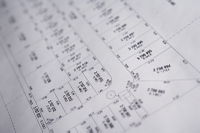|
|
 I flew into Marco Island, FL on Saturday to speak at a conference. During the flight, the pilot came over the PA system to tell us that he’d "have us on the ground in 37 and one third minutes."
I flew into Marco Island, FL on Saturday to speak at a conference. During the flight, the pilot came over the PA system to tell us that he’d "have us on the ground in 37 and one third minutes."
My first thought was…guess he knows what he’s doing.
In marketing materials, copywriters have a tendency to use round numbers or catch all phrases like "well over two thousand." What if instead the writer had used 2,482?
Which one feels more real? More accurate? Which one gives the communications piece more weight and credibility?
Exactly. So be exact.
